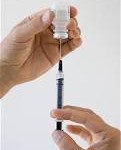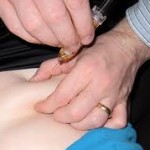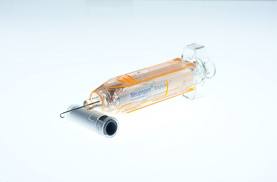The human body is protected by millions of lymphocytes or white blood cells. The shite blood cells of your body fight against the invading foreign bodies such as viruses, parasites, bacteria, and contaminants to make sure that your systems function optimally. Since lymphocytes are very important, their number needs to be kept stable. This is where Neupogen enters the scene.
Neupogen is also known as filgrastim. It is a synthetic protein that encourages the growth or the lymphocytes. If your white blood cells are healthy, then your body has a chance to fight against any kind of infection. Neupogen is used to treat the condition known as neutropenia, which is plainly, the deficiency in white blood cells brought about by underlying diseases, chemotherapy, tumors, or bone marrow transplants.
These are some of the additional information that you should consider about Neupogen:
1. Basics
 You should not attempt to self-inject this medication if you don’t understand the procedure. After you inject Neupogen, you should properly dispose of the syringes, needles, IV tubing, or any other item that is used in administering it. You should have your liver and blood tested regularly to help your physician the proper Neupogen treatment for you.
You should not attempt to self-inject this medication if you don’t understand the procedure. After you inject Neupogen, you should properly dispose of the syringes, needles, IV tubing, or any other item that is used in administering it. You should have your liver and blood tested regularly to help your physician the proper Neupogen treatment for you.
2. Before use
 If you are allergic to medications with E. coli or filgrastim, you should not take Neupogen. Remember that before you are prescribed with Neupogen, you should make sure that you tell your doctor is you have a blood cell disorder, sickle cell disorder, myolodysplasia/preleukemia, myeloid leukemia, and if the patient is receiving either radiation or chemotherapy treatment. Neupogen can harm the fetus inside the mother’s womb. You should inform your doctor if you are planning to become pregnant, are already pregnant, or are breastfeeding.
If you are allergic to medications with E. coli or filgrastim, you should not take Neupogen. Remember that before you are prescribed with Neupogen, you should make sure that you tell your doctor is you have a blood cell disorder, sickle cell disorder, myolodysplasia/preleukemia, myeloid leukemia, and if the patient is receiving either radiation or chemotherapy treatment. Neupogen can harm the fetus inside the mother’s womb. You should inform your doctor if you are planning to become pregnant, are already pregnant, or are breastfeeding.
3. Proper use
 The following are the things that you should remember in using Neupogen:
The following are the things that you should remember in using Neupogen:
- Simply follow your doctor’s instructions in taking Neupogen.
- Inject Neupogen just under your skin. This may be taught to you, including the use of an IV in your own home. Make sure that you don’t attempt to inject yourself with Neupogen if you don’t clearly understand how. Just leave it to the professionals.
- Do not be afraid to ask if you have things to clarify.
- If you have received chemotherapy, you should not be given Neupogen within 24 hours.
- You should not shake the bottle/syringe of Neupogen because you will degrade the medicine.
- If the Neupogen has already changed colors or is already expired, do not attempt to use it. Just ask for a new one.
- Inject in different parts of your body. Rotate each time of injection—legs, arms, hips, stomach. Make sure not to inject Neupogen into one spot two consecutive times.
- Every Neupogen vial is disposable after its single use.
- Use the disposable hypodermic needle only once and place them in puncture-proof conainers after use for safety.
- Store your Neupogen vials in the refrigerator and not in the freezer. Before injecting it, let it stand 24 hours in room temperature. Then get your dosage through your syringe before returning the vial into the refrigerator.
4. Missed dose
 If you miss a dose of Neupogen, then you must take one as soon as taking the dose comes to mind. Remember that if you just took radiotherapy or chemotherapy, do not take Neupogen within 24 hours. Just skip the dose that you missed if you are very close to taking the next one.
If you miss a dose of Neupogen, then you must take one as soon as taking the dose comes to mind. Remember that if you just took radiotherapy or chemotherapy, do not take Neupogen within 24 hours. Just skip the dose that you missed if you are very close to taking the next one.
5. Precautions
 When you are prescribed with Neupogen, you should follow your doctor’s instructions to the tee, including the restrictions in your activities, beverages, and food. Since your lymphocytes are weak, you should stay away from people who are sick or infected. Notify your doctor if you experience signs that you have an acquired infection.
When you are prescribed with Neupogen, you should follow your doctor’s instructions to the tee, including the restrictions in your activities, beverages, and food. Since your lymphocytes are weak, you should stay away from people who are sick or infected. Notify your doctor if you experience signs that you have an acquired infection.
6. Adverse effects
 You should be aware if you are allergic to Neupogen. If you are, you will have swelling (throat, face, tongue, or lips and difficulty of breathing. If you experience signs of any infection ( flu-like symptoms, fever, chills, easy bleeding or bruising, mouth sores, vomiting, nausea, appetite loss, body malaise, shortness of breath, and severe stomach pain radiating to the shoulder. Mild adverse effects of Neupogen are inflammation, itchiness, diarrhea, bone pain, constipation, hair loss, muscle aches, body weakness, hair loss, and skin rashes.
You should be aware if you are allergic to Neupogen. If you are, you will have swelling (throat, face, tongue, or lips and difficulty of breathing. If you experience signs of any infection ( flu-like symptoms, fever, chills, easy bleeding or bruising, mouth sores, vomiting, nausea, appetite loss, body malaise, shortness of breath, and severe stomach pain radiating to the shoulder. Mild adverse effects of Neupogen are inflammation, itchiness, diarrhea, bone pain, constipation, hair loss, muscle aches, body weakness, hair loss, and skin rashes.
You very well know that you should not take excessive amounts of  Neupogen. In case you overdosed yourself with Neupogen, immediately call for emergency medical treatment. Dial the medical emergency in your area immediately before symptoms get worse. To avoid this, be aware of the dosage that you should take. Never take more than the prescribed dosage that your doctor gave you.
